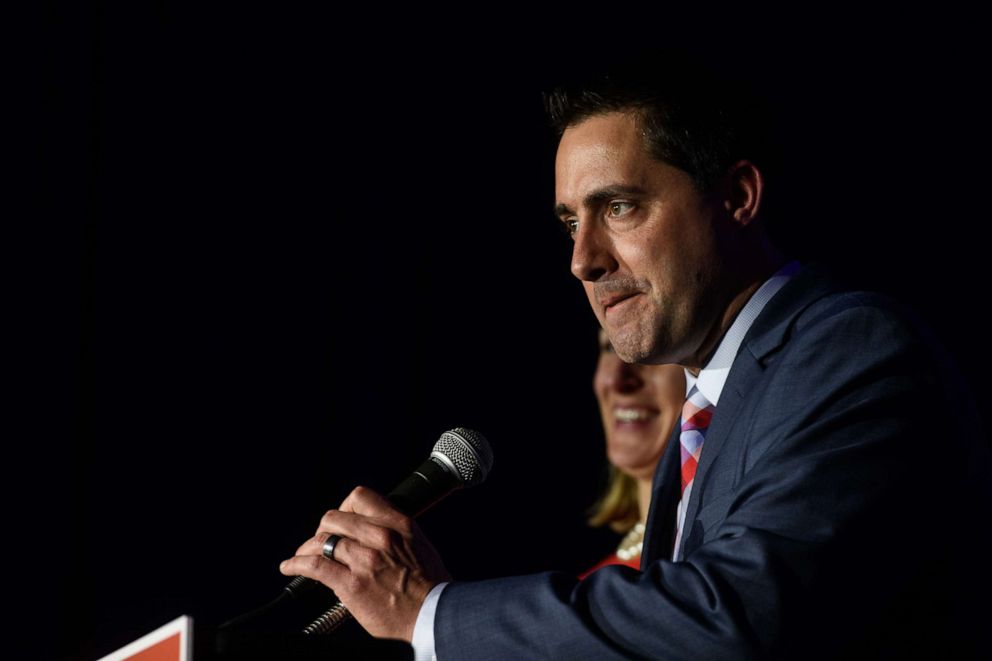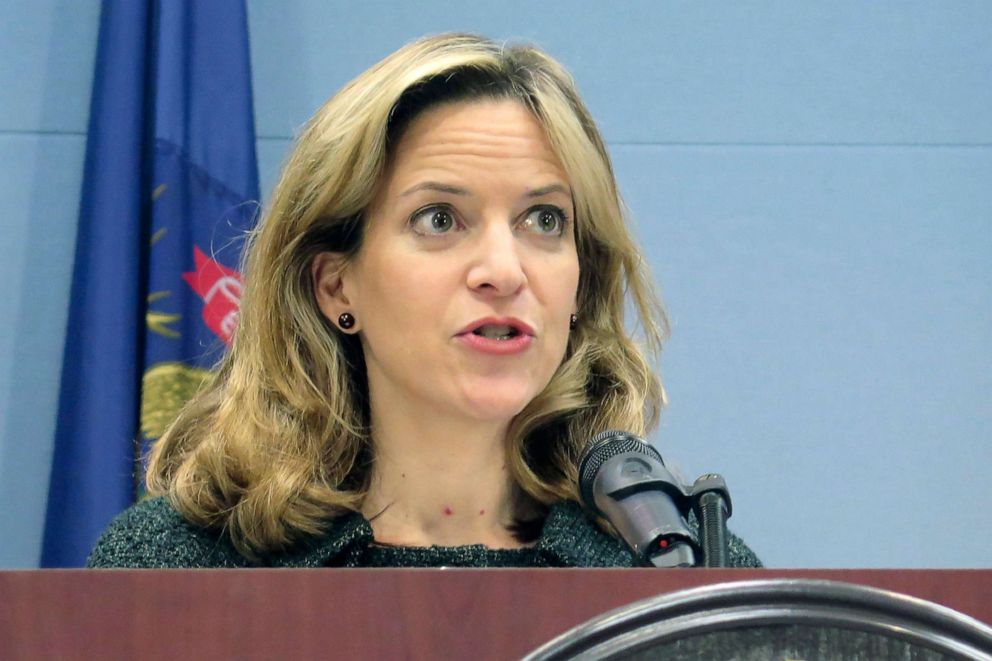该国与选举错误信息的战争正在模糊党派界限,因为两党的州官员都在共同努力抵御压制投票的努力,特别是在关键战场上。
共和党俄亥俄州国务卿弗兰克·拉罗斯(Frank LaRose)在接受美国广播公司新闻采访时说:“我们现在关注的三件事是选民登记、投票工作人员招聘,然后确保我们在那里获得准确的信息。”
在唐纳德·特朗普总统无情的背景下贬低邮件投票的企图这种循环——没有证据支持他的说法——选举官员正忙于应对虚假信息的威胁,这可能会导致更大的选民混乱。与此同时,他们正在为总统选举做准备,由于冠状病毒流行病。
拉罗斯说:“我们生活在一个大流行和所有其他事情都在发生的重要时代,所以这就是为什么我们需要比以往任何时候都更加警惕可能出现的这种虚假信息。”
在2016年总统大选后,错误信息成为今年选举的主要挑战误导和虚假信息的泛滥跨社交媒体平台。这种循环是错误信息运动的一个主要目标,鉴于其在选举中的突出地位,它已经成为通过邮件投票的方式。
拉洛斯最近被揭穿了推特视频在一位亲戚向他的妻子指出此事后,他要求他的办公室进一步调查此事。
在该州流传的视频中,一名妇女误导性地声称缺席投票是不安全的,因为信封上包含了选民的政党归属。拉罗斯解释说,但俄亥俄州从来不会在任何选举的选票信封上注明政党归属,并补充说,这名妇女所说的选票来自佛罗里达州棕榈滩县的一次初选。
“我最重要的职责之一是获得准确的信息,”拉罗斯说。“这是一个非常简单、直接的命题,视频中共享的信息不准确。不适用;这当然不适用于俄亥俄州。”

2018年11月6日,在俄亥俄州哥伦布市,弗兰克·拉罗斯在赢得俄亥俄州国务卿一职后发表了胜利演说。
在特朗普于2016年以8个百分点的优势击败希拉里·克林顿(Hillary Clinton)后,俄亥俄州再次成为本周期的战场。在这场竞选中,一些对选举有所倾斜的州以大约1个百分点的优势获胜,这是一个相对较大的优势。
俄亥俄州国务卿办公室表示,它正在寻找类似于视频中虚假信息的错误信息,在社交媒体上传播的城市传说和谣言,以及故意的虚假信息活动。俄亥俄州人可以向投票站报告他们看到的错误信息国务卿办公室。
LaRose的办公室还致力于培训社区如何识别和报告错误信息,特别是少数民族社区,他们往往是错误信息的目标。
“你永远无法追踪和揭穿每一个神话或每一个谣言或每一条虚假信息,”拉罗斯说。“这有点像打地鼠,就像总会有另一只出现在某个地方。但更好的策略是帮助人们更好地预防它,对他们读到的内容更加怀疑。”
除了在社交媒体上揭穿错误信息,拉罗斯还发出了误导信息,即使这些信息来自他自己的政党成员。当被问及总统时敦促他的支持者“两次”投票为了测试上周的选举制度,拉罗斯在周二的新闻发布会上回应说,“这不是俄亥俄州人应该做的事情。”
“当然,政府官员有时会拼错,或者说一些需要纠正的话,”他后来补充道,“当然,这不属于我们办公室制定的虚假信息协议,但它确实属于我想你会称之为错误信息的范畴,即说了一些不正确的话。作为国务卿,我有责任确保俄亥俄州人了解事实。”
密歇根州也在展开类似的反虚假信息的斗争。
国务卿和司法部长都是民主党人,他们正在调查一个针对底特律选民的错误的自动电话会议,底特律是民主党的堡垒,他们说这是在使用“带有种族色彩的陈规定型观念来阻止邮件投票”。
密歇根州国务卿乔斯林·本森在上个月晚些时候的一份声明中说:“这是对公民投票权撒谎的一种不合理、站不住脚、明目张胆的企图。”。“这一呼吁利用了选民对刑事司法系统的恐惧和不信任——在这一历史性时刻,系统的种族主义和由此造成的代际创伤遭到了清算和对抗——并将其扭曲成一种捏造的威胁,以阻止人们投票。"
录音兜售关于邮寄选票的虚假信息,试图说服选民不要使用这种替代方式——通过邮件声称投票向警方披露他们的个人信息,以挖掘“旧权证”,并向信用卡公司收取“未偿债务”。
电话上的女人说,这是代表1599项目进行的,这是一项由右翼阴谋论者雅各布·沃尔和杰克·伯克曼带头的行动。
“不要被骗把你的私人信息给那个人。录音说:“注意安全,谨防邮件投票。”

2020年3月5日,密歇根州兰辛,密歇根州国务卿乔斯林·本森在新闻发布会上发言。
本森和司法部长达纳·内塞尔在一份联合声明中说:“尽管打电话的人声称与杰克·伯克曼和雅各布·沃尔有关——这两个政治特工以传播错误信息以获得恶名而闻名——但打电话的来源仍然未知。”目前还不清楚有多少底特律居民收到了电话,或者它是否针对该州的任何其他城市。
然而,这些呼吁并不仅限于密歇根州,因为它们的目标是其他州的选民——包括本周期最关键的一些战场。官员在宾夕法尼亚州俄亥俄州、纽约州和伊利诺伊州也发出了类似的警告,以消除电话会议中关于邮件投票的任何错误说法,重申投票策略是“安全和可靠的”他们现在正在共同努力,以应对来自电话会议的任何潜在影响。
Nessel办公室发言人瑞安·贾维(Ryan Jarvi)在一份声明中对美国广播公司新闻(ABC News)表示:“这些州向我们表示,他们已经收到了来自市中心居民的类似电话投诉,但尚不清楚这些电话有多普遍。”“我们将继续与其他州和各级政府的合作伙伴合作,评估和解决这些刑事犯罪。”
本森说,随着对电话会议的调查继续进行,选举管理人员正专注于确定“可信的来源”,以便向被“直接旨在混淆选民的政治言论浪潮”淹没的选民提供准确的信息。
在新冠肺炎时代监督密歇根州选举的本森周三宣布,她的办公室正在向该州440万活跃的注册选民发送邮件,以准确通知他们如何在投票站以外申请投票,另外70万密歇根州人将收到一封详细说明如何注册投票的信。
但她在密歇根州扩大邮件投票的努力——四年前,特朗普以微弱优势在该州获得支持,当时克林顿的投票率不太高——也使她成为总统的目标,因为她宣布了一项计划,将缺席投票申请邮寄给密歇根州所有770万注册选民。
特朗普指出密歇根在5月份扩大了邮件投票,错误地声称这一决定是“非法的”。密歇根州的一名法官上个月底确认了这一举措,驳回了一项挑战本森权威的诉讼,并辩称国务卿确实有权向选民邮寄申请。
本森与白宫的冲突发生在密歇根州放宽投票限制两年后,该州允许任何选民在没有借口的情况下进行缺席投票。密歇根州超过210万选民已经要求为11月的选举进行缺席投票——这是战场上的一项记录——还有大约8周的时间。
The fight to combat election misinformation blurs partisan lines amid Trump's attack on mail-in voting
The country's war with election misinformation is blurring partisan lines, as state officials from both sides of the aisle are working in conjunction to fend off efforts to suppress votes -- particularly across key battlegrounds.
"The three things we're focused on right now are voter registration, poll worker recruitment and then making sure that we get accurate information out there," Ohio Secretary of State Frank LaRose, a Republican, said in an interview with ABC News.
Against the backdrop of President's Donald Trump's relentlessattempts to disparage vote-by-mailthis cycle -- without evidence supporting his claims -- election officials are hustling to tackle threats of false information, which could lead to greater voter confusion. At the same time, they're gearing up for a presidential election heavily relying on mail ballots due to thecoronaviruspandemic.
"We're living in consequential times with the pandemic, and with all the other things going on, and so this is why we need to be more alert than ever to that kind of disinformation that can be put out there," LaRose said.
Misinformation emerged as a central challenge in this year's election, after the 2016 presidential election saw therampant spread of misleading and false informationacross social media platforms. This cycle, a key target of misinformation campaigns has become vote-by-mail, given its prominence in the election.
LaRose recently debunkeda Twitter videoafter a relative pointed it out to his wife and he asked his office to investigate the content further.
In the video, which had been circulating in the state, a woman misleadingly alleges that absentee voting is not secure because the envelopes include voters' party affiliation. But Ohio never puts party affiliation on the outside of ballot envelopes in any election, LaRose explained, adding that the ballots the woman was speaking of were from a primary in Palm Beach County, Florida.
"One of my most important responsibilities is getting accurate information out there," LaRose said. "This one was a very sort of simple, straightforward proposition that the information shared in that video was not accurate. It didn't apply; it certainly didn't apply to Ohio."
Frank LaRose gives his victory speech after winning Ohio Secretary of State, Nov. 6, 2018, in Columbus, Ohio.
Ohio is once again a battleground this cycle, after Trump carried the state over Hillary Clinton by eight points in 2016 -- a relatively sizable advantage in a contest when a number of states that tipped the election in his favor were won by roughly one percentage point.
The Ohio secretary of state's office said it's looking for misinformation similar to the false information in the video, urban legends and rumors that spread on social media, as well as intentional disinformation campaigns. Ohioans can report misinformation they see around voting to thesecretary of state's office.
LaRose's office has also worked to train communities on how to recognize and report misinformation, particularly minority communities, which are often targets for misinformation.
"You'll never be able to track down and debunk every myth or every rumor or every piece of disinformation," LaRose said. "It kind of could be compared to Whack-a-Mole, like there's always going to be another one popping up somewhere. But what's the better tactic is to help people be more inoculated against it, to be more skeptical of what they read."
In addition to debunking misinformation on social media, LaRose has called out misleading messages even when they emerge from members of his own party. When asked about the presidenturging his supporters to vote "twice"to test the electoral system last week, LaRose responded at a press conference Tuesday, "that is not something Ohioans should do."
"Certainly public officials misspeak from time to time, or say something that needs to be corrected," he said, adding later, "certainly that doesn't fall in the disinformation protocol that our office has set up, but it does fall under the category of what I guess you would call misinformation, where something incorrect is said. And, it's my responsibility as secretary of state to make sure Ohioans know the facts."
A similar fight against disinformation is unfolding in Michigan.
The secretary of state and attorney general, both Democrats, are investigating a fallacious robocall targeting voters in Detroit, a Democratic bastion, which they said is using "racially-charged stereotypes to deter voting by mail."
"This is an unconscionable, indefensible, blatant attempt to lie to citizens about their right to vote," said Michigan Secretary of State Jocelyn Benson in a statement late last month. "The call preys on voters' fear and mistrust of the criminal justice system -- at a moment of historic reckoning and confrontation of systemic racism and the generational trauma that results -- and twists it into a fabricated threat in order to discourage people from voting."
The recording peddles false information about mail-in ballots in an effort to dissuade voters from using the alternative -- claiming vote-by-mail exposes their personal information to police to dig up "old warrants" and credit card companies to collect "outstanding debt."
The woman on the robocall says it was made on behalf of Project 1599, which is an operation spearheaded by Jacob Wohl and Jack Burkman, both right-wing conspiracy theorists.
"Don't be finessed into giving your private information to the man. Stay safe and beware of vote by mail," the recording says.
Michigan Secretary of State Jocelyn Benson speaks at a news conference in Lansing, Mich., March 5, 2020.
"Though the caller claims to be associated with Jack Burkman and Jacob Wohl -- two political operatives with a known reputation for spreading misinformation in an effort to gain notoriety -- the source of the call is still unknown," Benson and Attorney General Dana Nessel said in a joint statement. It is also not clear at this point how many Detroit residents received the robocall or if it is targeting any other cities in the state.
The calls are not confined to Michigan, though, as they have been targeting voters in other states -- including some of this cycle's most crucial battlegrounds. Officials inPennsylvania, Ohio, New York and Illinois made similar warnings to dispel any erroneous claims about vote-by-mail in the robocall, reiterating that the voting tactic is "safe and secure." They are now working together to counter any potential ramifications from the robocall.
"These states have indicated to us that they have received similar robocall complaints from residents in their urban centers, though it's unclear how pervasive the calls have been," Ryan Jarvi, a spokesperson for Nessel's office, told ABC News in a statement. "We will continue to work with partners in other states and levels of government to evaluate and address these criminal offenses."
As the investigation into the robocall continues, election administrators, Benson said, are focused on identifying "trusted sources" to deliver accurate information to voters who are being "inundated" by "a rising tide of political rhetoric that is directly designed to confuse voters."
Benson, who is overseeing Michigan's election in the age of COVID-19, announced on Wednesday that her office is sending mailers to the state's 4.4 million active registered voters to accurately inform them how to apply to vote away from a polling site, and another 700,000 Michiganders will be mailed a letter detailing how to register to vote.
But her endeavor to expand vote-by-mail in Michigan -- a state Trump carried by the narrowest of margins four years ago, when Clinton saw less-than-stellar turnout -- also landed her in the president's crosshairs after she announced a plan to mail absentee ballot applications to all 7.7 million registered voters in Michigan.
Trump singled out Michigan for its expansion of vote-by-mail back in May, falsely claiming that the decision was made "illegally." A Michigan judge late last month affirmed the move, dismissing a lawsuit challenging Benson's authority and arguing that the secretary of state does have the power to mail applications to voters.
Benson's clash with the White House comes two years after Michigan eased restrictions on voting practices, by allowing any voter to cast an absentee ballot without an excuse. More than 2.1 million voters in Michigan have already requested an absentee ballot for November's election -- a record in the battleground -- with still about eight weeks to go.






